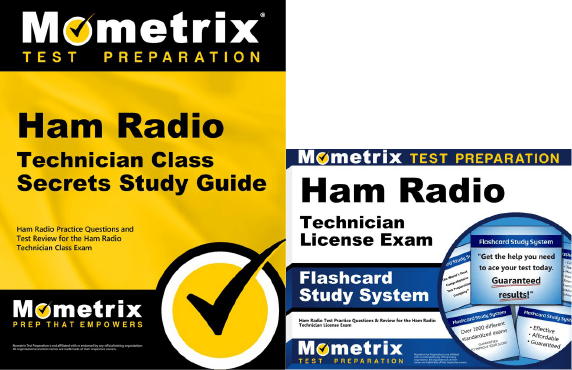If you need help studying for the Ham Radio Technician Class exam or just want some more information about what the exam is like, you’ve come to the right place.
Click below to take a free Ham Radio Technician Class practice test!
Exam Eligibility
The Technician Class exam is an entry-level exam, so there are no special eligibility requirements you have to meet before you take it.
Once you pass, you’ll be set to take the General Class and Extra Class exams!
What’s on the Exam?
The Technician Class exam contains 35 multiple-choice questions, which are grouped into 10 sections. The questions in each section are pulled from a question pool, so each administration of the test contains a different set of questions.
There isn’t a set time limit, but it usually takes anywhere from 10 to 45 minutes to finish the exam.
Let’s take a closer look at the different sections.
1. COMMISSION RULES
6 questions
- Purpose and permissible use of the Amateur Radio Service
- Meanings of basic terms used in the FCC rules
- Operator/primary station license grant
- Interference
- Frequency allocations
- Spectrum sharing
- Transmissions near band edges
- International communications
- Authorized and prohibited transmissions
- Station identification
- Control operator duties
- Control operator privileges
- License renewal
2. OPERATING PROCEDURES
3 questions
- Choosing an operating frequency
- Repeater offsets
- VHF/UHF operating practices
- Emergency operations
- Applicability of FCC rules
- RACES and ARES
- Net and traffic procedures
- Operating restrictions during emergencies
- Resolving operational problems
3. RADIO WAVE PROPAGATION
3 questions
- How a radio signal travels
- Fading
- Multipath radio waves
- Polarization
- Wavelength vs. frequency
- Nature and velocity of electromagnetic waves
- Relationship of wavelength and frequency
- Electromagnetic spectrum definitions (UHF, VHF, and HF)
- Sporadic E
- Meteor scatter
- Auroral propagation
- Tropospheric ducting
- Line of sight and radio horizon
4. AMATEUR PRACTICES
2 questions
- Station setup
- Mobile radio installation
- Filters
- Bandwidth selection
- Microphone gain
- Squelch function
- Frequency tuning
5. ELECTRICAL PRINCIPLES
4 questions
- Decibels
- Conversion of electrical units
- Current and voltage
- Ohm’s Law
- Series and parallel circuits
- Impedance definition and units
- Radio frequency definition and units
- Capacitance and inductance terms and units
- Calculating power
6. ELECTRONIC AND ELECTRICAL COMPONENTS
4 questions
- Basic principles and applications of solid-state devices
- Diodes and transistors
- Fixed and variable resistors
- Capacitors
- Inductors
- Fuses
- Voltage regulators
- Circuit diagram structure
- Using of schematics
- Rectifiers
- Resonant circuit
7. PRACTICAL CIRCUITS
4 questions
- Transceivers
- Receivers
- Transmitter amplifiers
- Modulation
- Oscillators
- Mixers
- PTT
- Distortion
- Interference and consumer electronics
- Measuring SWR
- Antenna and transmission line measurements and troubleshooting
- Effects of high SWR
- Using dummy loads when testing
8. SIGNALS AND EMISSIONS
4 questions
- Basic characteristics of FM and SSB
- Use of SSB for weak signal work
- Selection of USB vs. LSB
- Use of FM or VHF packet and repeaters
- Bandwidth of various modulation modes (Fast-scan TV, SSB, FM, and CW)
- Amateur satellite operation
- Satellite tracking programs
- Modulation mode selection
- Doppler shift
- Setting uplink power
- Telemetry and telecommand
- Operating protocols
- Digital Mobile Radio
9. ANTENNAS AND FEED LINES
2 questions
- Definition and types of beam antennas
- Relationships between resonant length and frequency
- Concept of antenna gain
- Vertical and horizontal polarization
- Common portable and mobile antennas
- SWR concepts
- Feed lines
10. SAFETY
3 questions
- Lightning protection
- Power circuits and hazards
- Grounding
- Hazardous voltages
- Fuses and circuit breakers
- Battery safety
- RF hazards
How to Register
To get register, you’ll need to visit the ARRL website to locate a testing session near you, which will provide you with the necessary contacts, time, and location of available testing appointments.
Before you can actually take the exam, you’ll also need to register with the FCC and get an FCC Registration Number (FRN).
Exam Scores
To get a passing score, you’ll need to get a score of at least 74%, which means you answered at least 37 questions correctly.
You should be given your final score report as soon as you finish the exam. When you pass, you become eligible to take the General Class exam.
Retaking the Exam
If you didn’t get a passing score on your first try, that’s okay! You can retake the test as many times as you need to, and you can even retake it on the same day as your first attempt.
Keep in mind that the questions you receive on retakes will be different than on your first attempt.
FAQs
How many questions are on the Ham Radio Technician Class exam?
The exam contains 35 questions.
What is the time limit for the Ham Radio Technician Class exam?
There isn’t a strict time limit, but it usually takes less than an hour to complete.
What is the passing score for the Ham Radio Technician Class exam?
You’ll need to get a final score of at least 74% to pass.
How much does the Ham Radio Technician Class exam cost?
The testing fee varies, but it usually costs around $15.



 Ham Radio Study Guide
Ham Radio Study Guide Ham Radio Flashcards
Ham Radio Flashcards